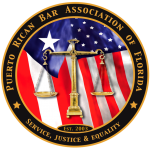
PRACTICE OF LAW IN THE STATE OF FLORIDA*
The State of Florida has strict requirements for the admission of attorneys to the practice of law, which is regulated by Supreme Court of Florida under Article V, Section 15 of the Constitution of the State of Florida. The two arms of the Supreme Court’s regulatory functions are the Florida Board of Bar Examiners and the Florida Bar. The state of Florida has no comity or reciprocity with any of the 50 states, or Puerto Rico. Therefore, to be authorized to practice law in Florida, a qualified attorney must sit for and pass the Florida Bar Exam. The qualifications and requirements for admission to the practice of law in Florida are further explained on the website of the FL Board of Bar Examiners. Every attorney desiring to practice law in Florida must be a member of the Florida Bar.
Although a trained professional may work as a paralegal, there is also a registration and certification process available for paralegals in Florida, which is not required but is preferred by most employers. More information on paralegal requirements are available on these pages: FRP Resource Page of the Florida Bar and LawyerEdu.org.
The unlicensed practice of law is prohibited in Florida, and the Florida Bar is tasked with protecting the public against it. Limited appearances as an attorney in Florida are allowed under certain specific circumstances in court proceedings where the court’s permission has been previously sought and granted. The Florida Bar must also be included in the motion or verified statement filed seeking limited appearances. More information on the unlicensed practice of law and limited appearances is available at this link.
Notary Public is a designation granted by the Florida Department of State. Unlike in some civil law jurisdictions, where only a trained attorney can function as a notary, any citizen in good standing may apply for and obtain a notary public designation upon completion of a course, exam, and payment of certain fees. Upon licensure, a notary public obtains a seal, which must be renewed after a specific period. Certain obligations and rules govern the notarization of documents in Florida. Additional information on Florida’s requirements for an exam and licensure fees of Notaries are available on this link.
*This page is for informational purposes only and the information herein does not constitute legal advice.
